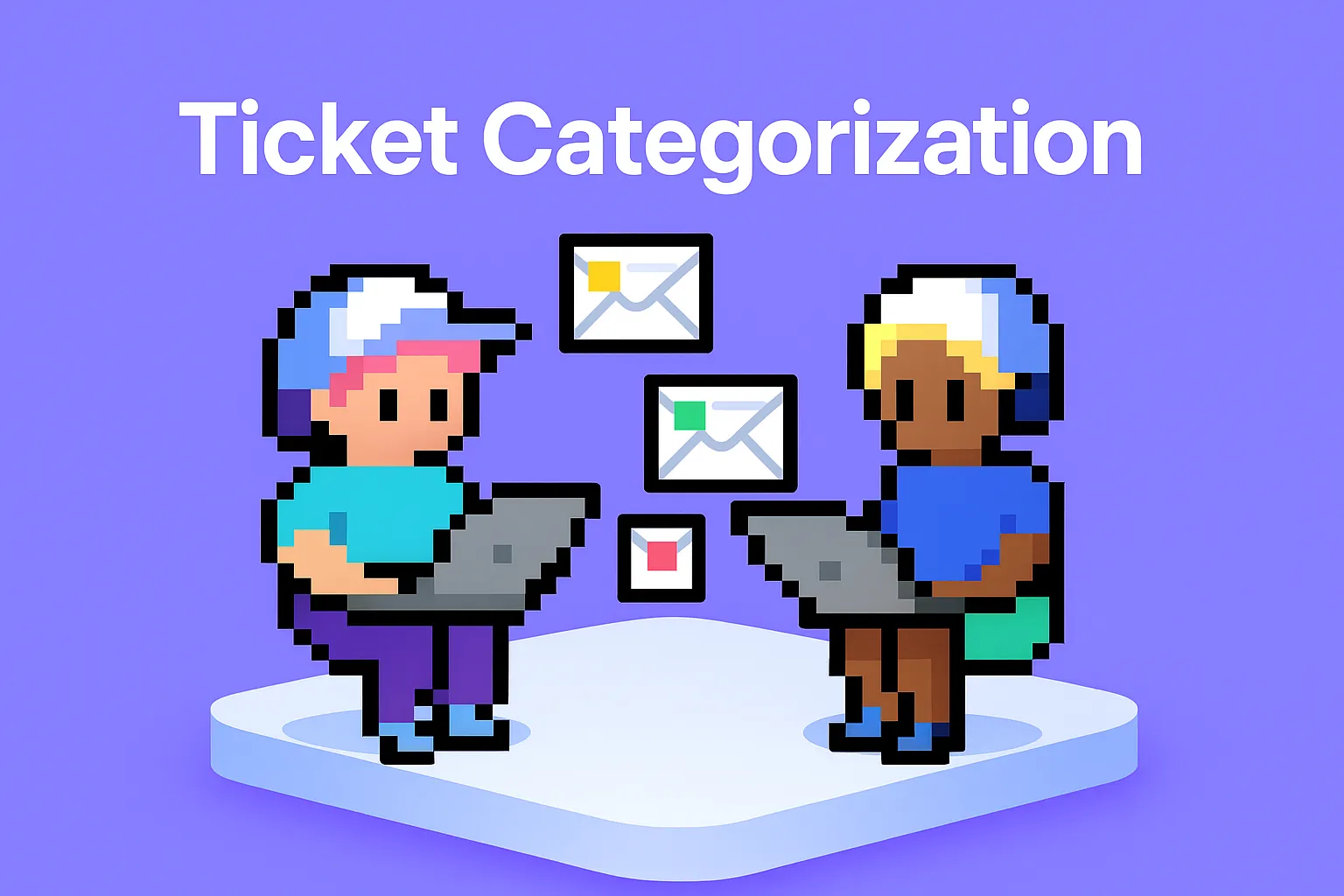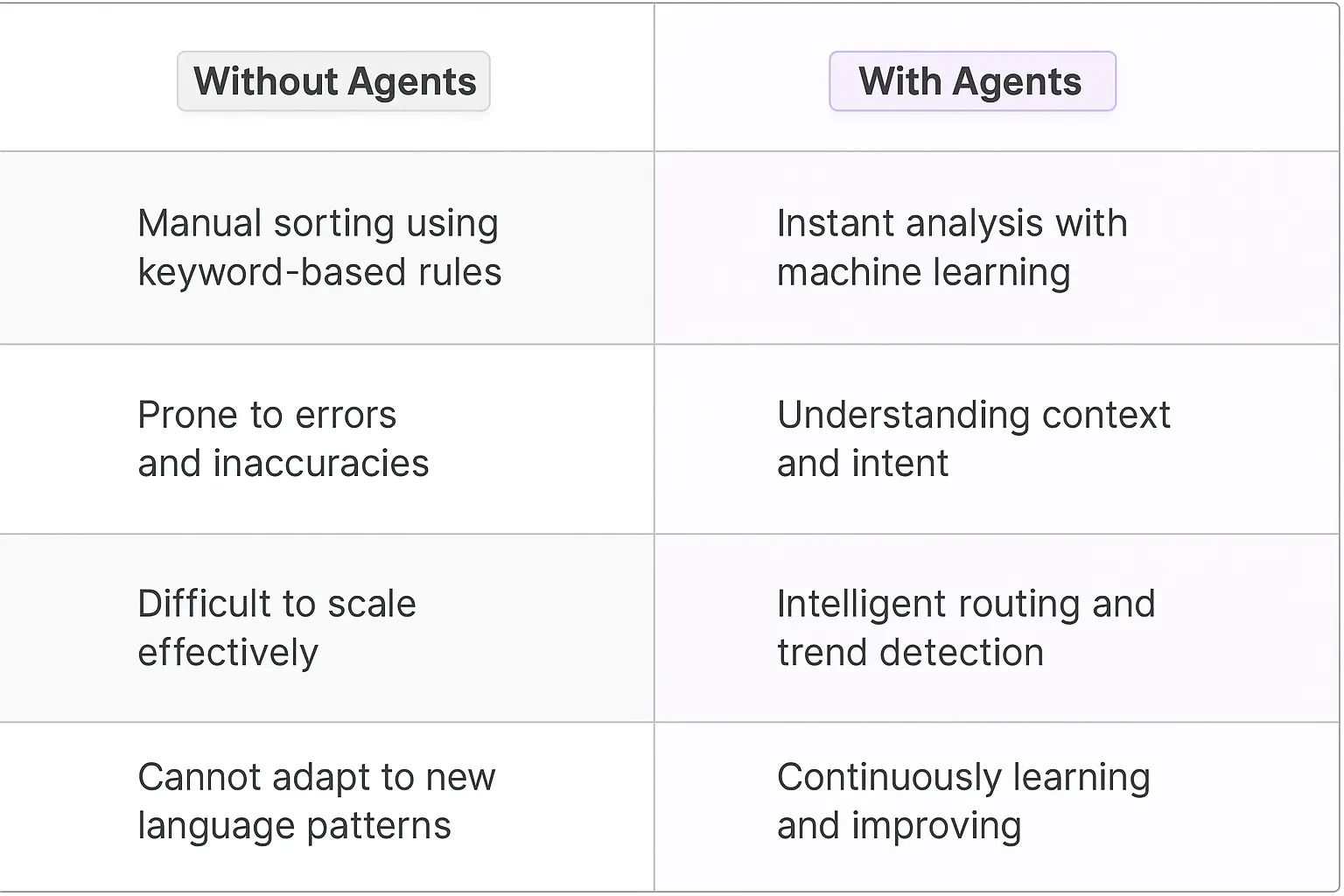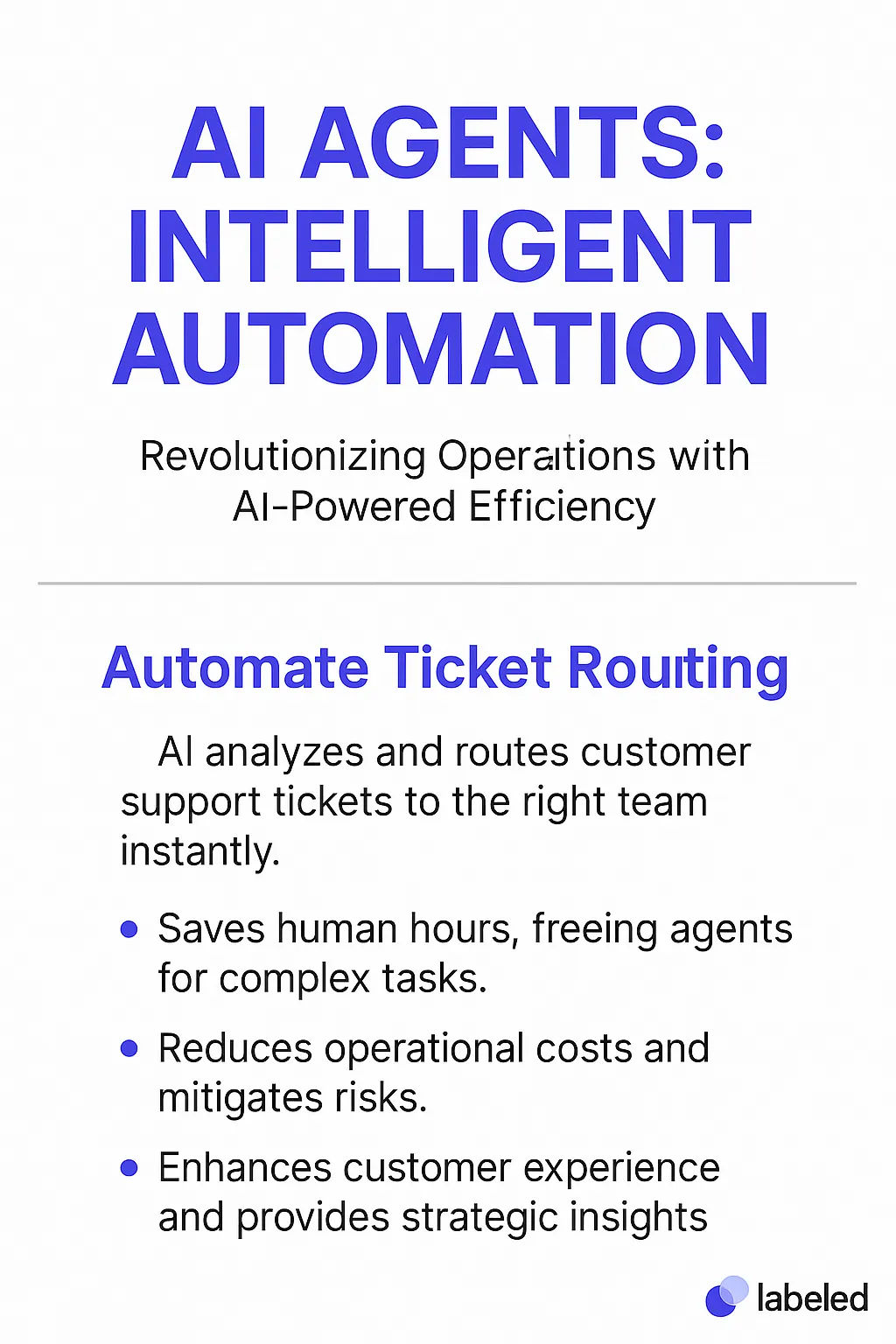Customer Support Ticket Categorization AI Agents
Understanding Customer Support Ticket Categorization and AI Agents
What is Customer Support Ticket Categorization?
Customer Support Ticket Categorization is the process of sorting and classifying incoming customer inquiries based on their content, urgency, and required expertise. It's the crucial first step in the support workflow that determines how quickly and effectively a customer's issue will be resolved. Traditionally a manual and time-consuming task, it's now being transformed by AI agents that can analyze and categorize tickets in real-time with remarkable accuracy.
Key Features of Customer Support Ticket Categorization
- Automated Analysis: AI agents can instantly parse through ticket content, understanding context and intent beyond simple keyword matching.
- Multi-label Classification: These systems can assign multiple relevant categories to a single ticket, capturing the full complexity of customer issues.
- Continuous Learning: The AI improves over time, adapting to new types of issues and evolving customer needs.
- Intelligent Routing: Based on categorization, tickets are automatically assigned to the most appropriate support team or individual.
- Trend Detection: AI agents can identify patterns in ticket types, alerting teams to emerging issues or opportunities.
- Integration Capabilities: These systems can seamlessly connect with existing CRM and support tools, enhancing overall workflow efficiency.

Benefits of AI Agents for Customer Support Ticket Categorization
What would have been used before AI Agents?
Before AI agents entered the scene, customer support teams were stuck in a manual labyrinth of ticket sorting. Picture support reps spending hours each day playing a never-ending game of "which category does this belong to?" It was like trying to organize a library where every book looked the same from the outside.
Companies relied on rule-based systems or keyword matching, which were about as effective as using a butter knife to cut through a steel beam. These methods often missed the nuances of customer issues, leading to misrouted tickets, delayed responses, and frustrated customers wondering if their messages were lost in a black hole.
What are the benefits of AI Agents?
Enter AI agents for ticket categorization, and suddenly it's like giving your support team superpowers. These digital teammates can parse through tickets at lightning speed, understanding context and intent in ways that make traditional methods look like ancient hieroglyphics.
The real game-changer is the learning capability. Unlike static systems, AI agents improve over time, adapting to your company's unique language and customer base. It's like having a support rep who never sleeps, never takes a vacation, and gets smarter with every interaction.
But here's where it gets really interesting: AI agents don't just categorize; they provide insights. They can spot trends before they become apparent to human eyes, giving companies a crystal ball into emerging issues or opportunities. This predictive power allows support teams to shift from reactive to proactive, addressing problems before customers even realize they exist.
The ripple effects are significant. Support reps, freed from the drudgery of ticket sorting, can focus on what they do best: solving complex problems and building relationships with customers. This leads to higher job satisfaction and lower turnover rates in an industry notorious for burnout.
For customers, the benefits are equally transformative. Faster, more accurate routing means quicker resolutions. No more bouncing between departments or repeating their story to multiple agents. It's like every customer gets a VIP fast-pass to the exact help they need.
From a business perspective, the efficiency gains are off the charts. We're talking about slashing response times, increasing first-contact resolution rates, and dramatically improving customer satisfaction scores. All of this translates to improved retention rates and, ultimately, a healthier bottom line.
In the end, AI agents for ticket categorization aren't just an upgrade; they're a complete paradigm shift in how we approach customer support. They're turning what was once a cost center into a strategic asset, capable of driving customer loyalty and informing product development. It's not just about sorting tickets anymore; it's about unlocking the full potential of every customer interaction.

Potential Use Cases of AI Agents for Customer Support Ticket Categorization
Customer support ticket categorization is a critical yet often overlooked aspect of running a successful business. It's the unsung hero that can make or break your customer experience. Let's dive into how AI agents are transforming this space, bringing efficiency and accuracy to a whole new level.
Processes
- Automated Triage: AI agents can instantly analyze incoming tickets, categorizing them based on urgency, complexity, and required expertise. This ensures that high-priority issues get immediate attention, while routine queries are handled efficiently. Automated Triage systems are revolutionizing how support teams prioritize their workload.
- Language Analysis: These digital teammates excel at understanding context and sentiment in customer messages. They can detect frustration, urgency, or satisfaction, allowing support teams to tailor their responses accordingly.
- Continuous Learning: As AI agents process more tickets, they become smarter. They learn from past categorizations, adapting to new types of issues and evolving customer needs, ensuring the categorization system stays relevant and effective.
Tasks
- Multi-label Classification: AI agents can assign multiple relevant categories to a single ticket, capturing the full complexity of customer issues. This nuanced approach ensures that tickets are routed to the right team with all necessary context.
- Anomaly Detection: These digital teammates can flag unusual patterns or spikes in certain types of tickets, alerting support teams to potential widespread issues or emerging trends that require immediate attention.
- Knowledge Base Integration: AI agents can link categorized tickets to relevant articles in the knowledge base, suggesting potential solutions to support staff or even directly to customers for quick self-service resolution.
- Ticket Routing: Based on the categorization, AI agents can automatically assign tickets to the most appropriate support team or individual, reducing response times and improving first-contact resolution rates. Advanced Ticket Routing systems ensure optimal resource allocation.
The impact of AI agents on customer support ticket categorization is profound. They're not just sorting tickets; they're elevating the entire support ecosystem. By handling the heavy lifting of categorization, these digital teammates free up human agents to focus on what they do best: solving complex problems and building meaningful relationships with customers.
As we look to the future, the potential for AI in this space is immense. We're moving towards a world where support systems can predict and preemptively address customer issues before they even arise. The companies that embrace these technologies now will be the ones setting the gold standard for customer experience in the years to come.

Industry Use Cases
AI agents for customer support ticket categorization are reshaping how businesses handle customer inquiries across sectors. These digital teammates bring a level of efficiency and accuracy that's transforming support operations. Let's dive into some specific industry applications that showcase the power of AI in ticket categorization.
In e-commerce, AI agents are becoming indispensable for managing the high volume of diverse customer issues. They're adept at quickly distinguishing between shipping inquiries, product questions, and return requests, ensuring each ticket lands in the right queue for prompt resolution.
For SaaS companies, these AI agents excel at categorizing technical support tickets. They can differentiate between user interface problems, integration issues, and feature requests with remarkable precision, allowing dev teams to prioritize and address concerns efficiently.
In the travel industry, AI agents are proving invaluable for airlines and hotels. They categorize tickets related to booking changes, loyalty program inquiries, and special accommodations, enabling staff to provide personalized assistance more quickly.
These use cases are just the tip of the iceberg. As AI technology evolves, we're seeing these digital teammates take on increasingly complex categorization tasks across industries, fundamentally changing how businesses approach customer support.
E-commerce Revolution: AI-Powered Ticket Categorization
The e-commerce industry is ripe for disruption with Customer Support Ticket Categorization AI Agents. Let's dive into how these digital teammates can transform the way online retailers handle customer inquiries.
Consider a major e-commerce platform dealing with thousands of support tickets daily. These range from order tracking and returns to product inquiries and technical issues. Traditionally, human agents would manually sort through this deluge, often leading to delays and misclassifications.
Enter the AI-powered categorization agent. This digital teammate can instantly analyze incoming tickets, understanding context and intent with remarkable accuracy. It's not just about keyword matching; we're talking about deep learning models that grasp nuanced language and customer sentiment.
Here's where it gets interesting: The AI doesn't just categorize – it learns and adapts. As it processes more tickets, it becomes increasingly adept at identifying emerging issues or trends. For instance, it might detect a spike in queries about a particular product feature, flagging this for the product team before it becomes a widespread concern.
But the real game-changer is in resource allocation. By instantly routing tickets to the right department or specialist, the AI dramatically cuts response times. A shipping query goes straight to logistics, while a technical glitch is routed to IT support. This precision targeting means customers get faster, more accurate responses, driving up satisfaction scores and loyalty.
Moreover, this AI-driven approach allows human agents to focus on complex, high-value interactions. They're no longer bogged down by routine categorization tasks, freeing them to provide the kind of personalized, empathetic service that builds lasting customer relationships.
The ripple effects are significant. With more efficient ticket handling, e-commerce businesses can scale their operations without proportionally increasing support staff. This leads to substantial cost savings and improved operational efficiency.
In the cutthroat world of online retail, where customer experience can make or break a business, AI-powered ticket categorization isn't just an upgrade – it's a competitive necessity. It's the difference between drowning in support tickets and surfing the wave of customer satisfaction.
Financial Services: AI-Driven Ticket Triage for Wealth Management
The wealth management sector is ripe for disruption, and AI-powered ticket categorization is the catalyst. Let's break down how this tech is reshaping customer support in an industry where time literally equals money.
Picture a high-end wealth management firm juggling inquiries from high-net-worth individuals. These aren't your run-of-the-mill support tickets. We're talking about complex portfolio questions, time-sensitive trade executions, and delicate compliance issues. The stakes? Millions of dollars and client trust.
Traditional ticket routing here is a nightmare. A misclassified inquiry could mean a missed investment opportunity or a compliance issue. Enter the AI categorization agent - a digital teammate that's about to flip the script.
This AI doesn't just sort tickets; it understands the nuances of finance. It can differentiate between a routine balance inquiry and a potential fraud alert. It grasps the urgency in a client's language about market movements. More importantly, it learns the individual preferences and history of each high-value client.
The real magic happens in prioritization. A VIP client's urgent request about a market dip gets fast-tracked to their personal advisor. A potential compliance issue is immediately flagged for the legal team. Meanwhile, a general inquiry about the firm's sustainable investing options is routed to the appropriate specialist.
But here's where it gets interesting: The AI becomes a proactive tool for relationship management. It spots patterns in client inquiries that might indicate dissatisfaction or interest in new services. Imagine an AI flagging that three of your top clients have asked about cryptocurrency exposure in the last week. That's actionable intelligence for your product team.
For the wealth managers themselves, this AI is like having a super-smart executive assistant. They're no longer drowning in a sea of inquiries. Instead, they're focused on high-impact client interactions, armed with context and insights provided by the AI.
The bottom line? In an industry where personal touch is paramount, AI ticket categorization paradoxically enables more human interaction. It frees up wealth managers to do what they do best: build relationships and make strategic decisions.
This isn't just about efficiency; it's about competitive edge. In a world where the ultra-wealthy have endless options, the firm that responds fastest and most accurately wins. AI-driven ticket categorization isn't just nice to have; it's the new table stakes in wealth management.
As we've seen in other industries, the early adopters of this tech will likely see outsized returns. They'll be able to handle more clients with the same headcount, provide more responsive service, and ultimately, grow their assets under management faster than the competition.
The wealth management firms that embrace this AI revolution won't just be playing a different game - they'll be rewriting the rules of client service in finance.
Considerations
Technical Challenges
Implementing a Customer Support Ticket Categorization AI Agent isn't just about slapping on a fancy algorithm and calling it a day. It's a complex dance of data, machine learning, and user experience that requires careful choreography.
First off, you're dealing with the messiness of human language. Customers don't neatly package their issues into predefined categories. They rant, they rave, they use emojis and slang. Your AI needs to make sense of all this noise and extract the core issue. It's like trying to find a needle in a haystack, except the needle keeps shape-shifting.
Then there's the challenge of keeping up with the ever-evolving landscape of customer issues. New products, features, or bugs can pop up overnight, and your AI needs to adapt quickly. It's not enough to train your model once and let it loose. You need a system that can learn on the fly, picking up new categories and nuances as they emerge.
And let's not forget about accuracy. A misclassified ticket isn't just a minor inconvenience - it can lead to delays, frustrated customers, and wasted agent time. Striking the right balance between speed and accuracy is crucial. You want your AI to be quick on its feet, but not at the cost of making wild guesses.
Operational Challenges
On the operational side, integrating an AI categorization system into existing workflows is like performing open-heart surgery on a marathon runner - it's delicate, complex, and you can't afford to slow things down.
Training your support team to work alongside this new digital teammate is a significant undertaking. Some agents might view it as a threat to their jobs, while others might over-rely on it. Finding the sweet spot where human expertise and AI capabilities complement each other is key.
There's also the question of transparency. When a ticket gets categorized, do you let the customer know it was done by AI? How do you explain the process if they ask? Balancing transparency with maintaining customer confidence is a tightrope walk.
Data privacy is another minefield. Your AI is handling sensitive customer information, and you need robust systems in place to ensure this data is protected. One breach could shatter customer trust and land you in hot regulatory water.
Lastly, measuring the impact of your AI system isn't straightforward. Sure, you can track metrics like categorization accuracy and time saved. But how do you quantify the improvement in customer experience or the long-term impact on your support team's efficiency? It's not just about the numbers - it's about telling a compelling story of transformation that justifies the investment and guides future improvements.
Transforming Customer Support: The Impact of AI-Powered Ticket Categorization
Customer Support Ticket Categorization AI Agents are more than just a technological upgrade - they're a paradigm shift in customer support. By automating the complex task of ticket categorization, these digital teammates are enabling businesses to respond faster, more accurately, and more efficiently to customer needs. The ripple effects are profound: improved customer satisfaction, reduced operational costs, and the ability to scale support operations without proportionally increasing headcount.
But the true power of these AI agents lies in their ability to turn support from a cost center into a strategic asset. By providing deep insights into customer issues and trends, they're enabling businesses to be more proactive, identifying and addressing problems before they escalate. This predictive capability, combined with the freed-up capacity of human agents to focus on high-value interactions, is setting a new standard for customer experience.
As we look to the future, the companies that embrace and master this technology will likely see outsized returns. They'll be able to handle higher volumes of inquiries, provide more personalized service, and ultimately, build stronger, more lasting relationships with their customers. In the evolving landscape of customer support, AI-powered ticket categorization isn't just a competitive advantage - it's becoming table stakes for businesses that want to thrive in the age of the customer.













